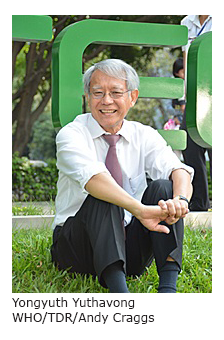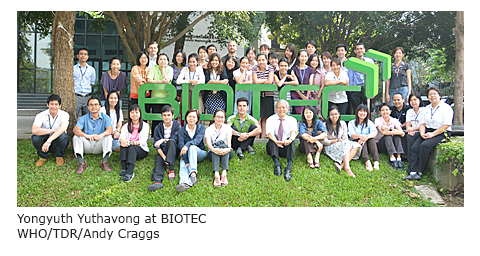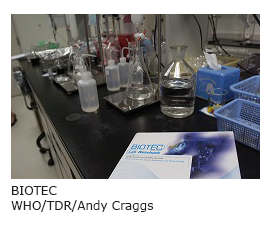As his name suggests, Dr Yongyuth Yuthavong hails from a family of soldiers. His father was a colonel in the Royal Thai Army, his brothers both officers in the Navy, one rising to the rank of Supreme Commander.
 “Yongyuth is Thai for
‘always fighting,’ and Yuthavong means ‘fighting family,’” he says. “But I was the mutant.”
“Yongyuth is Thai for
‘always fighting,’ and Yuthavong means ‘fighting family,’” he says. “But I was the mutant.”
Indeed, the first president of Thailand’s National Science and Technology Development Agency (NSTDA) and, for a time, Minister of Science & Technology, the former TDR grantee would choose a different path, focusing instead on organic chemistry and pursuing his studies abroad – undergraduate work at the University of London, then a doctorate at Oxford.
The ‘60s were a thrilling time to be a chemist, says Yuthavong. Watson and Crick had deduced DNA’s double helix a decade earlier, and now the first protein structures were emerging from labs. “It was so exciting,” he recalls. “Finally, you could link up chemistry with function and understand how and why the enzyme catalyzed reactions.”
When he returned to Thailand’s Mahidol University, Yuthavong resumed the work on enzymes he’d started at Oxford only to find that no one there understood what they were. Forced to look elsewhere for funding – the Thai government could offer him only paltry support – he applied for, and later received, a TDR grant to study the red cell membranes of malaria-infected erythrocytes. “I realized that I could use chemistry and biochemistry to understand the parasite's life and processes,” he says. “I realized I could use my expertise to tackle a significant problem.”
Building a national science policy and support
Still, Yuthavong knew that without a policy infrastructure to support scientific research, he would never go far. “I would have to support myself by doing things other than science,” he says. Determined to safeguard his career, Yuthavong launched a lobbying campaign targeting the country’s power brokers. After long days in the lab, he would get out and talk to anyone who would listen. And his message was simple: developing a science policy was not only necessary for growing the ranks of Thai scientists, it was vital to the country’s future.
We don’t have to rely on the international community to get things done, we can stand on our own.
- Dr Yongyuth Yuthavong
That message resonated with the country’s research community, including the Secretary General of Thailand’s National Research Council, who lent his support to a symposium Yuthavong wanted to organize around science policy. “People were electrified by this,” he says of the symposium. “That was really the catalyst for the establishment in 1979 of the Ministry of Science and Technology.”
No sooner had the Ministry opened its doors than Yuthavong began orchestrating another campaign: Thailand’s bid to build and host an institute for genetic engineering and biotechnology for the United Nations Industrial Development Organization (UNIDO). Thailand was short-listed for the new centre, but ultimately lost out to India, sending a disappointed Yuthavong and team back to the drawing board. Determined to push ahead, they decided that Thailand should build its own institute, and Yuthavong himself penned the proposal for what would come to be known as the National Genetic Engineering and Biotechnology Center (BIOTEC).

“That was an important learning experience,” he says. “It taught us that we don’t have to rely on the international community to get things done, that we can stand on our own.”
Recognized that year as an “Outstanding Scientist of Thailand,” Yuthavong was tapped to be director of the new centre he’d helped create, serving until 1989. Three years later, he became the first president of Thailand’s National Science & Technology Development Agency (NSTDA), and from there went on to serve a four year term as president of the Thai Academy of Science and Technology. Then, in 2006, Yuthavong was appointed Thailand’s Minister of Science and Technology, filling in for a 16-month stint at the behest of the regime that had taken power in the wake of a coup.
A breakthrough in understanding malaria parasite drug resistance
Yuthavong did what he could as Minister to reform the state of science in Thailand. But, a researcher at heart, he had little appetite for politics. “It was not by choice but by necessity that I was there,” he says. “I am much more interested in science than science administration.” Indeed, long before accepting the post, Yuthavong had returned to the lab at Mahidol. There, with his team of biochemists, he launched an ambitious effort to determine the structure of Plasmodium falciparum dihydrofolate reductase–thymidylate synthase.
A malaria parasite enzyme, DHFR, as it is known, was targeted by antifolate drugs like pyrimethamine and cycloguanil. Mutations to the enzyme were preventing the drugs from binding properly. Using X-ray crystallography, Yuthavong and team hoped to resolve the structure of the enzyme in order to see how exactly these changes affected drug resistance. And in 2003, they succeeded, publishing their findings to wide acclaim in the journal Nature Structural Biology.
Armed with an understanding of the basis for resistance in the enzyme’s active site, Yuthavong and team then began designing compounds capable of averting the effects of mutation. The Thai team won a grant from the Medicines for Malaria Venture (MMV), from which they discovered an efficacious candidate called P218, and went on to further develop the compound in collaboration with scientists at Monash University in Australia and the London School of Hygiene and Tropical Medicine (LSHTM). Last summer, MMV signed an agreement with NSTDA to move P218 into the advanced preclinical stage, a major step forward for Thai science.
“Never has a majority Thai team delivered a drug to clinical development,” says Dave Matthews, the scientific founder of Agouron Pharmaceuticals, Inc, who worked with Yuthavong’s group at BIOTEC. “For this to happen with a drug that is poised to have a major effect on a disease that is endemic in Thailand, on a terrible disease, is a huge development.”
Mentoring the next generation
Even as Yuthavong spearheaded the development of P218, he remained closely involved with TDR, bringing his wealth of experience to several expert committees. Deeply grateful for the TDR support he’d received early in his own career, he wanted to give back, he says, and to assist TDR’s efforts to nurture and support promising young researchers in their work on diseases of poverty.
 Yuthavong has made
time to mentor individual researchers, among them two TDR grantees. In 2007, Dr Chairat Uthaipibull, an immunologist in Yuthavong’s lab at BIOTEC, was awarded a TDR Career Development Fellowship to investigate the development of plasmodium surrogate
models for anti-folate screening against malaria parasites. And in 2011, Dr Darin Kongkasuriyachai, another immunologist in Yuthavong’s lab, was also awarded a TDR fellowship to assist Yuthavong in analysing trends in health research around
infectious diseases of poverty, with an emphasis on innovation.
Yuthavong has made
time to mentor individual researchers, among them two TDR grantees. In 2007, Dr Chairat Uthaipibull, an immunologist in Yuthavong’s lab at BIOTEC, was awarded a TDR Career Development Fellowship to investigate the development of plasmodium surrogate
models for anti-folate screening against malaria parasites. And in 2011, Dr Darin Kongkasuriyachai, another immunologist in Yuthavong’s lab, was also awarded a TDR fellowship to assist Yuthavong in analysing trends in health research around
infectious diseases of poverty, with an emphasis on innovation.
With Yuthavong leading the way, the latter would form a major component of TDR’s Global Report on Health Research for Infectious Diseases of Poverty, published in 2012. The Global Report represents a research-focused overview of priorities and needs concerning infectious diseases of poverty, and of the current landscape of funding and initiatives. And with respect to innovation, says Yuthavong, “the gaps are enormous.”
Some tools remain inaccessible to the poor, he says. Others can’t be translated into products suitable for developing countries. And for many infectious diseases of poverty, there is no technology at all. “These are gaps the whole world must work to fill.”
For more information, contact:
Makiko Kitamura
TDR Communications Officer
Telephone: +41 22 791 2926
email: kitamuram@who.int

